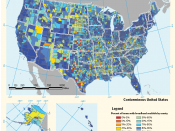Media and Social PolicyMedia has deeply influenced societal views, and in turn shapes policy-making. The general public consumes media information, which is presented in a dramatic, visually attractive and entertaining format through newspaper, television, radio, etc. Additionally editorials and commentaries can be structured to steer the consumer. Inevitably values are determined. These values then become the motivation for the public to rally behind certain social policy.
The Telecommunications Act of 1996 is the first major reconstruction of the telecommunication laws in almost 62 years. The goal of this reconstruction was to allow anyone to enter any communications business and to let any communications business compete in any market against another. The Act had the potential to change the way we work, live and learn. It affected telephone service, cable programming and other video services, broadcast services, and services provided to schools. The Telecommunications Act of 1996 was finally passed, after twelve years of Congress carefully minimizing its responsibilities in the most important areas.
This major change received considerable media and press attention. (www.fcc.gov)Communications through these means, as they have been developed, have been regulated since 1934 when The Federal Communications Act of 1934 established the Federal Communications Commission (FCC), and empowered this agency to make rules regulating local, state, and national communications. Because of the widespread use of communicating with computers through modems, this agency will undoubtedly continue to regulate the communications environment and database accessibility in the future. (www.fcc.gov)The Federal Communications Commission (FCC) was established on June 19, 1934 as a result of congress. The Federal Communications Commission (FCC) is an independent regulatory government agency that regulates interstate and foreign communications. They monitor radio communications, telegraph, telephone, and television communications. (www.fcc.gov)The Federal Communications Commission (FCC) makes all decisions regarding granting or modifying broadcasting licenses. It generally is expected to...



Good
I really liked it and I do think that media has a huge role in society.
Thanks!!
1 out of 1 people found this comment useful.